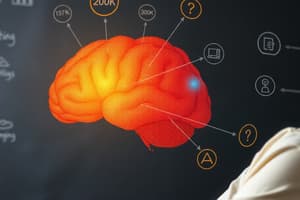Podcast
Questions and Answers
What is the definition of cognition?
What is the definition of cognition?
All the mental activities associated with thinking, knowing, remembering, and communicating.
What is the definition of executive functioning?
What is the definition of executive functioning?
The cognitive abilities and processes that allow humans to plan or inhibit their actions.
What is the definition of a concept?
What is the definition of a concept?
A mental grouping of similar objects, events, ideas, or people.
What is the definition of a prototype?
What is the definition of a prototype?
What is the definition of schemas?
What is the definition of schemas?
What is the definition of a mental map?
What is the definition of a mental map?
What is the definition of an algorithm?
What is the definition of an algorithm?
What is the definition of a heuristic?
What is the definition of a heuristic?
What is the definition of the availability heuristic?
What is the definition of the availability heuristic?
What is the definition of the representativeness heuristic?
What is the definition of the representativeness heuristic?
What is the definition of the gambler's fallacy?
What is the definition of the gambler's fallacy?
What is the definition of confirmation bias?
What is the definition of confirmation bias?
What is the definition of belief perseverance?
What is the definition of belief perseverance?
What is the definition of overconfidence bias?
What is the definition of overconfidence bias?
What is the definition of the sunk-cost fallacy?
What is the definition of the sunk-cost fallacy?
What is the definition of functional fixedness?
What is the definition of functional fixedness?
What is the definition of divergent thinking?
What is the definition of divergent thinking?
What are Sternberg's 5 components of creative thinkers?
What are Sternberg's 5 components of creative thinkers?
What is the definition of expertise?
What is the definition of expertise?
What is the definition of imaginative thinking skills?
What is the definition of imaginative thinking skills?
What is the definition of selective attention?
What is the definition of selective attention?
What is the definition of a creative environment?
What is the definition of a creative environment?
What is the definition of intrinsic motivation?
What is the definition of intrinsic motivation?
What is the definition of the cocktail party effect?
What is the definition of the cocktail party effect?
What is the definition of the Stroop Effect?
What is the definition of the Stroop Effect?
What is the definition of phonemic processing?
What is the definition of phonemic processing?
What is the definition of structural processing?
What is the definition of structural processing?
What is the definition of semantic processing?
What is the definition of semantic processing?
What is the definition of effortful processing/encoding?
What is the definition of effortful processing/encoding?
What is the definition of the framing effect?
What is the definition of the framing effect?
What is the definition of encoding?
What is the definition of encoding?
What is the definition of storage?
What is the definition of storage?
What is the definition of retrieval?
What is the definition of retrieval?
What is the definition of sensory memory?
What is the definition of sensory memory?
What is the definition of iconic memory?
What is the definition of iconic memory?
What is the definition of short-term memory (STM)?
What is the definition of short-term memory (STM)?
What is the definition of the phonological loop?
What is the definition of the phonological loop?
What is the definition of the central executive?
What is the definition of the central executive?
What is the definition of the Visuo-Spatial Scratchpad?
What is the definition of the Visuo-Spatial Scratchpad?
What is the definition of long-term memory?
What is the definition of long-term memory?
What is the definition of implicit memory (nondeclarative)?
What is the definition of implicit memory (nondeclarative)?
What is the definition of procedural memory?
What is the definition of procedural memory?
What is the definition of explicit memory?
What is the definition of explicit memory?
What is the definition of explicit (declarative memory)?
What is the definition of explicit (declarative memory)?
What is the definition of prospective memory?
What is the definition of prospective memory?
What is the definition of autobiographical memory?
What is the definition of autobiographical memory?
What is the definition of a venturesome personality?
What is the definition of a venturesome personality?
What is the definition of mass practice (cramming)?
What is the definition of mass practice (cramming)?
Flashcards
Cognition
Cognition
All the mental activities associated with thinking, knowing, remembering, and communicating.
Metacognition
Metacognition
Thinking about thinking.
Executive Functioning
Executive Functioning
The cognitive abilities and processes that allow humans to plan or inhibit their actions.
Concept
Concept
Signup and view all the flashcards
Prototype
Prototype
Signup and view all the flashcards
Schemas
Schemas
Signup and view all the flashcards
Mental Maps
Mental Maps
Signup and view all the flashcards
Algorithm
Algorithm
Signup and view all the flashcards
Heuristic
Heuristic
Signup and view all the flashcards
Availability Heuristic
Availability Heuristic
Signup and view all the flashcards
Representativeness Heuristic
Representativeness Heuristic
Signup and view all the flashcards
Gambler's Fallacy
Gambler's Fallacy
Signup and view all the flashcards
Confirmation Bias
Confirmation Bias
Signup and view all the flashcards
Belief Perseverance
Belief Perseverance
Signup and view all the flashcards
Overconfidence Bias
Overconfidence Bias
Signup and view all the flashcards
Sunk-cost Fallacy
Sunk-cost Fallacy
Signup and view all the flashcards
Mental Set
Mental Set
Signup and view all the flashcards
Functional Fixedness
Functional Fixedness
Signup and view all the flashcards
Divergent Thinking
Divergent Thinking
Signup and view all the flashcards
Convergent Thinking
Convergent Thinking
Signup and view all the flashcards
Sternberg's 5 components of creative thinkers
Sternberg's 5 components of creative thinkers
Signup and view all the flashcards
Expertise
Expertise
Signup and view all the flashcards
Imaginative Thinking Skills
Imaginative Thinking Skills
Signup and view all the flashcards
Attention
Attention
Signup and view all the flashcards
Selective Attention
Selective Attention
Signup and view all the flashcards
Creative Environment
Creative Environment
Signup and view all the flashcards
Intrinsic Motivation
Intrinsic Motivation
Signup and view all the flashcards
Cocktail Party Effect
Cocktail Party Effect
Signup and view all the flashcards
Stroop Effect
Stroop Effect
Signup and view all the flashcards
Phonemic Processing
Phonemic Processing
Signup and view all the flashcards
Structural Processing
Structural Processing
Signup and view all the flashcards
Semantic Processing
Semantic Processing
Signup and view all the flashcards
Effortful Processing/Encoding
Effortful Processing/Encoding
Signup and view all the flashcards
Framing effect
Framing effect
Signup and view all the flashcards
Encoding
Encoding
Signup and view all the flashcards
Storage
Storage
Signup and view all the flashcards
Retrieval
Retrieval
Signup and view all the flashcards
Sensory Memory
Sensory Memory
Signup and view all the flashcards
Iconic Memory
Iconic Memory
Signup and view all the flashcards
Echoic Memory
Echoic Memory
Signup and view all the flashcards
Short-Term Memory (STM)
Short-Term Memory (STM)
Signup and view all the flashcards
Phonological Loop
Phonological Loop
Signup and view all the flashcards
Central Executive
Central Executive
Signup and view all the flashcards
Visuo-Spatial Scratchpad
Visuo-Spatial Scratchpad
Signup and view all the flashcards
Spacing Effect
Spacing Effect
Signup and view all the flashcards
Long-Term Memory
Long-Term Memory
Signup and view all the flashcards
Implicit Memory (nondeclarative)
Implicit Memory (nondeclarative)
Signup and view all the flashcards
Procedural
Procedural
Signup and view all the flashcards
Explicit Memory
Explicit Memory
Signup and view all the flashcards
Explicit (Declarative Memory)
Explicit (Declarative Memory)
Signup and view all the flashcards
Semantic
Semantic
Signup and view all the flashcards
Episodic
Episodic
Signup and view all the flashcards
Prospective Memory
Prospective Memory
Signup and view all the flashcards
Autobiographical Memory
Autobiographical Memory
Signup and view all the flashcards
Venturesome Personality
Venturesome Personality
Signup and view all the flashcards
Mass Practice (Cramming)
Mass Practice (Cramming)
Signup and view all the flashcards
Testing Effect
Testing Effect
Signup and view all the flashcards
Study Notes
Cognitive Processes
- Cognition: All mental activities, including thinking, knowing, remembering, and communicating.
- Metacognition: Thinking about thinking, reflecting on one's own cognitive processes.
- Executive Functioning: Cognitive skills enabling planning and controlling actions.
- Concept: A mental grouping of similar objects, events, or ideas.
- Prototype: A mental image, best example of a category.
- Schemas: Mental frameworks organizing and interpreting information.
- Mental Maps: An individual's image or picture of space, based on their perception, knowledge.
- Algorithm: A step-by-step procedure for solving a problem.
- Heuristic: A rule-of-thumb strategy for problem-solving.
- Availability Heuristic: Estimating event likelihood based on how readily instances come to mind.
- Representativeness Heuristic: Judging things based on how well they fit prototypes, disregarding other relevant info.
- Gambler's Fallacy: False belief that probabilities change based on past events (e.g., a coin flip).
- Confirmation Bias: Seeking information that confirms existing beliefs.
- Belief Perseverance: Sticking to beliefs even after disproving evidence.
- Overconfidence Bias: Overestimating accuracy of one's decisions or judgments.
- Sunk-Cost Fallacy: Decisions influenced by past investments, even if the current investment isn't worthwhile.
- Mental Set: Approaching problems in a particular way, often successful in the past.
- Functional Fixedness: Thinking of things only in terms of their usual functions.
- Divergent Thinking: Generating multiple potential solutions to a problem.
- Convergent Thinking: Evaluating existing solutions and selecting the best one.
- Sternberg's 5 Components of Creative Thinkers: Expertise, imaginative thinking, venturesome personality, intrinsic motivation, and creative environment.
Memory Processes
- Expertise: A vast base of knowledge.
- Imaginative Thinking Skills: Seeing things in novel ways.
- Attention: Focusing awareness on specific stimuli.
- Selective Attention: Concentrating on one stimulus amidst many.
- Creative Environment: Surrounding oneself with creative individuals.
- Intrinsic Motivation: Being driven by interest and passion.
- Cocktail Party Effect: Ability to focus on one voice in a noisy environment.
- Stroop Effect: Difficulty naming ink color when words of a different color are written.
- Phonemic Processing: Encoding information based on its sound.
- Structural Processing: Encoding info by its physical appearance.
- Semantic Processing: Encoding info based on its meaning.
- Effortful Processing/Encoding: Encoding requiring attention and conscious effort.
- Framing Effect: Decisions affected by how a choice is presented.
- Encoding: Converting sensory information into usable form.
- Storage: Holding onto information for a period.
- Retrieval: Recalling information from storage.
- Sensory Memory: Initial brief recording of sensory information.
- Iconic Memory: Visual sensory memory.
- Echoic Memory: Auditory sensory memory.
- Short-Term Memory (STM): Brief, limited-capacity storage (about 20-30 seconds, 7 items).
- Phonological Loop: Part of working memory for verbal and auditory information.
- Central Executive: Part of working memory directing attention and processing.
- Visuo-Spatial Scratchpad: Processes visual information.
- Spacing Effect: Better retention with distributed study than massed study.
- Long-Term Memory: Relatively permanent storage of information.
- Implicit Memory (Nondeclarative): Knowledge of how to do something (procedural memories).
- Procedural Memory: Knowledge of how to do something.
- Explicit Memory (Declarative): Consciously known facts and experiences.
- Semantic Memory: Network of facts and concepts (general knowledge).
- Episodic Memory: Collection of personal experiences.
- Prospective Memory: Remembering to do things in the future.
- Autobiographical Memory: Memory related to one's personal life.
- Mass Practice (Cramming): Quick learning but quick forgetting.
- Testing Effect: Retrieval practice (testing oneself) improves retention.
Cognitive Biases and Solutions
- Venturesome Personality: Seeking new experiences, tolerating uncertainty.
Studying That Suits You
Use AI to generate personalized quizzes and flashcards to suit your learning preferences.




